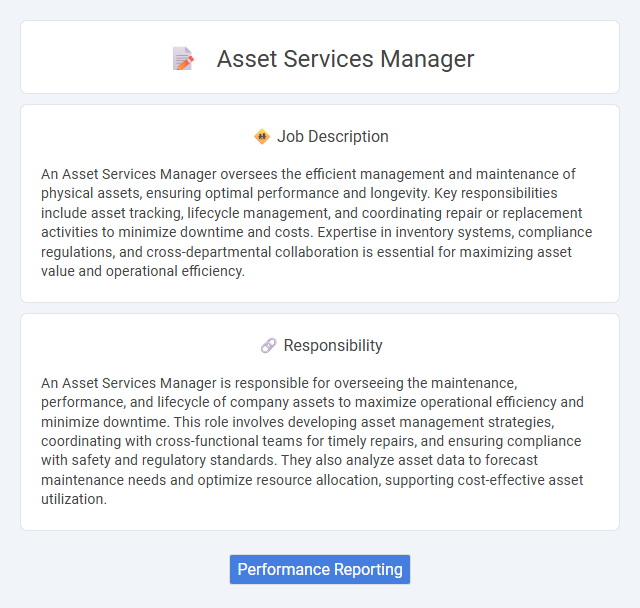
An Asset Services Manager oversees the efficient management and maintenance of physical assets, ensuring optimal performance and longevity. Key responsibilities include asset tracking, lifecycle management, and coordinating repair or replacement activities to minimize downtime and costs. Expertise in inventory systems, compliance regulations, and cross-departmental collaboration is essential for maximizing asset value and operational efficiency.
Individuals with strong organizational skills and attention to detail are likely suitable for an Asset Services Manager role, as the position involves overseeing asset maintenance and tracking. Those who demonstrate effective communication and problem-solving abilities may find it easier to coordinate with teams and manage resources efficiently. However, people who prefer less responsibility and multitasking might find this role challenging and less fitting for their work style.
Qualification
An Asset Services Manager typically requires a bachelor's degree in finance, business administration, or a related field, combined with several years of experience in asset management or financial services. Professional certifications such as CFA (Chartered Financial Analyst) or CAIA (Chartered Alternative Investment Analyst) enhance qualifications and demonstrate expertise. Strong analytical skills, proficiency in asset management software, and a thorough understanding of regulatory compliance are essential for effective asset portfolio oversight.
Responsibility
An Asset Services Manager is responsible for overseeing the maintenance, performance, and lifecycle of company assets to maximize operational efficiency and minimize downtime. This role involves developing asset management strategies, coordinating with cross-functional teams for timely repairs, and ensuring compliance with safety and regulatory standards. They also analyze asset data to forecast maintenance needs and optimize resource allocation, supporting cost-effective asset utilization.
Benefit
An Asset Services Manager is likely to experience considerable benefits, including enhanced career growth opportunities and competitive compensation packages. This role probably offers the chance to develop expertise in asset management, leading to increased job security and professional recognition. Access to advanced tools and training could further improve efficiency and job satisfaction.
Challenge
The role of an Asset Services Manager likely involves navigating complex challenges related to optimizing asset performance and ensuring regulatory compliance. A key difficulty may stem from balancing cost efficiency while maintaining asset reliability and operational continuity. There is a probable need for strong problem-solving skills to address unexpected asset failures and fluctuating market demands.
Career Advancement
An Asset Services Manager oversees the efficient management and optimization of physical and financial assets within an organization. Career advancement in this field often leads to senior roles such as Asset Director or Chief Asset Officer, emphasizing strategic planning, risk management, and portfolio optimization. Mastery of asset lifecycle management, data analytics, and regulatory compliance enhances promotion prospects and leadership opportunities.
Key Terms
Performance Reporting
An Asset Services Manager specializes in Performance Reporting by analyzing financial and operational data to assess asset efficiency and profitability. They generate detailed reports that highlight key performance indicators (KPIs), trends, and risk factors to support strategic decision-making. Expertise in data visualization tools and asset management software ensures accurate monitoring and optimization of asset performance.
 kuljobs.com
kuljobs.com